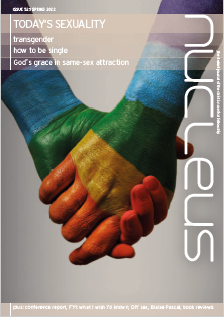'Don't go there!' If the preceding article sparked that sentiment, this piece is for you. Wouldn't it be easier if the Bible allowed us to 'let it be' about gender and transgender? How can we be loving to people if we don't affirm the feelings they describe?
Yet we don't take this approach in other areas of life or medicine. We consider carefully what the Scriptures say. We don't necessarily affirm every feeling a patient may share, or accede to everything they might request.
context
There have always been patients who question their gender identity. The diagnosis of 'Gender Identity Disorder' [1] was thought rare, although had huge implications in the lives of those affected.
The clinical and societal picture has changed. More people present with gender identity difficulties. Patients tend to be younger, with a much bigger focus on children and adolescents, and far more likely to have been born female than before.
This affects far more people than just patients and healthcare professionals. Teachers in particular have to navigate this complex topic much more often than before. Pastors and church youth workers are far more likely to need to support those in their congregations who are dealing with such questions first-hand. And of course, parents must navigate something that was very rare indeed in their own generation.
Yet many clinicians or pastors are extremely wary of this subject. Church leaders may feel it is 'medical' and hard for them to tackle. GPs or community paediatricians may feel it is a complex area, best 'left to experts'. But 'experts' are hard to find, with specialists having long waiting lists. The generalist who wants to help is in a difficult position. Most treatments are unlicensed and have a limited evidence base. The toxic nature of social media interaction around this subject is not likely to attract a church leader into engagement in the wider world.
medical treatment and consent in young people
Not all 'transitioning' need involve medicine. 'Social transitioning' describes use of a new name or pronouns or adoption of obviously opposite-sex modes of dress. While not medical as such, this is in itself a significant intervention, and parents or schools who need to choose whether to enable this or not have limited evidence on which to base a decision.
Not everyone who socially transitions will necessarily want any other treatment. For those that do, medical treatments for young people fall into two main categories. GnRH analogues effectively 'switch off' sex hormones, and stop the progress of puberty. They have long been used temporarily to delay development in cases of precocious puberty. In a transgender context, they are often labelled 'puberty blockers'. In theory, these drugs are given so that an adolescent has time to decide whether they might want to stop the drugs, or go onto take 'cross-sex hormones' (oestrogen or testosterone) with the aim of developing secondary sexual characteristics of the opposite sex.
Neither puberty-blockers nor cross-sex hormones are licensed for these specific uses. Recent reviews suggest that a very high proportion of patients who use puberty blockers do go on to take cross-sex hormones, suggesting that they are not actually allowing them 'time to decide'.
Safety data regarding the long-term effects of puberty blockers is very limited.
All of these concerns (which are referenced in detail in the CMF Quick Guide) make proper consent for these treatments very difficult. There have been ongoing court cases in England during 2020-21 over these issues. The Department of Health is currently awaiting full findings of an independent review commissioned into the subject. [2]
The potentially irreversible nature of these treatments is a particular problem when only about one in six of those who suffer with gender dysphoria in childhood will still express this after puberty.
what can a Christian medic do?
learn
England's sole gender dysphoria service for young people is currently offering first appointments to those referred more than four years ago. [3] Young people need support while waiting; we cannot simply 'leave it to the specialists'. What is to stop us learning about it? We can engage with training and resources and improve our knowledge so that we can be of some support.
Indeed, by the time someone has reached the top of the waiting list at a gender clinic, they will likely have been 'socially transitioned' for some time, already set on a path that may lead to irreversible treatments. The non-specialist (who may not necessarily be a GP, but could be a school counsellor, or a medical student on placement) is likely to meet them earlier in this process. It may then be possible to explore the factors behind feelings of gender dysphoria, and talk about the evidence (or lack thereof) for treatment. Later on, patient expectations of a particular pathway for care may make such exploration harder to do without appearing to disregard a decision the young person has effectively already made.
remember 'normal' healthcare
Quite understandably, young people with gender dysphoria may find interactions with health professionals difficult. Like others, they may have little experience of seeking care for themselves. They may be unsure how their feelings will be received. Physical examination may be more difficult for them if they are deeply uncomfortable with their body. There is a high incidence of co-morbid mental health problems in those suffering from gender dysphoria, and patients are more likely to be on the autistic spectrum. All these things need care as good as we would give to anyone else. It is very hard to do that without some understanding of their gender issues. This is all the more reason for anyone hoping to serve this patient group well to develop at least a basic understanding of their needs.
help others to talk about it
Most of the time as students or non-specialist professionals, we aren't the 'front-line' person dealing with gender dysphoria. This is more likely a parent, youth worker, or teacher.
Given that our studies force us to confront these questions, we may be able to serve the church and wider society in helping with at least the healthcare aspects of the topic.
We need to be clear about what the Bible does say, but also what it does not. If emphasising differing roles for males and females, we need to be careful to avoid narrow stereotypes that often draw more on culture than Scripture. Otherwise, for the Christian teenager surrounded by peers questioning their gender identity, we may create a problem where there was none.
It may help to differentiate between formally diagnosable gender incongruence and the much wider range of feelings around gender. Some element of the latter has always been quite common among teenagers and is surely not pathological. It does not follow that every young person who questions their gender identity has a diagnosable problem or requires treatment.
We can use current medical reports to challenge the perception that there is a clear pathway for care in gender dysphoria. The CQC rated the only children's gender clinic in England as 'inadequate' in 2021. Concerns included poor documentation of risks, and a culture in which staff could not easily raise concerns. Dr Hilary Cass' independent review of services published an interim report early in 2022. Notably, this suggested that far from a clear consensus behind treatment for these children in what was, after all, a specialist centre, there was 'lack of consensus and open discussion about the nature of gender dysphoria and therefore about the appropriate clinical response'.' [4] The interim findings have led Health Secretary Sajid Javid to review the topic urgently. [5] The review is expected to eventually give clearer guidelines on puberty-blocking drugs, following a NICE evidence evaluation's finding that there is very limited evidence of their efficacy against a range of measures. [6] All these findings can help challenge the narrative that the only option for a gender questioning young person is to begin hormonal treatment.
clinical questions
Often in ethics we are keen to draw a line about what we will not do (for example, prescribing drugs for a medical abortion). If as Christians we are uneasy with the idea of medically assisting transition between genders, at what point might we feel we cannot be involved? Most of these will arise after qualification. I have considered some of the issues in an adult context in Nucleus in the past. [7] There is also a helpful document from the Royal College of General Practitioners [8] that covers many of the concerns that any non-specialist should have around prescribing these medications. Safety and medico-legal concerns may well stop us prescribing before any conscience questions come into play.
Another question might be around referrals for further care. It may well be appropriate to refer young people to Child and Adolescent Mental Health Services if there are underlying mental health concerns. There may be more discomfort around referring to what is currently the only available gender service for children, particularly given that the CQC rates it 'inadequate'. However, the non-availability of anything else leaves little alternative.
CMF has also received questions from members (often nurses) who have concerns about administering 'puberty-blocking' drugs. In these cases, as well as around referrals, the best option if there is a conscientious objection would be to reach an accommodation with an employer that someone else should deal with these patients. [9] This choice is likely to limit our own opportunities to care for these patients and therefore needs to be weighed carefully.
conclusion
The vast majority of our interactions with young people who are questioning their gender identity will involve 'normal' healthcare and discussion. Therefore, we need to engage as much as possible, stepping into a gap that few are willing to fill. If we are ready to talk about these symptoms, as we do about any other health condition, we can explore young people's stories, we can help them receive support with any concurrent mental health conditions. We can ensure that they have a real and informed choice over any transitioning treatments they may eventually want to pursue.
































